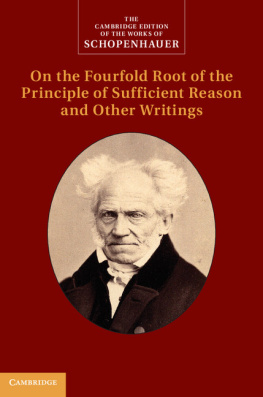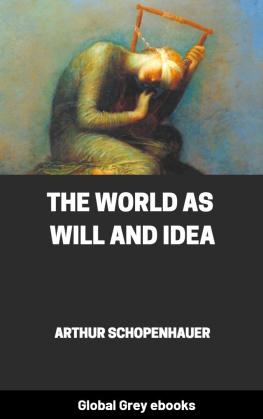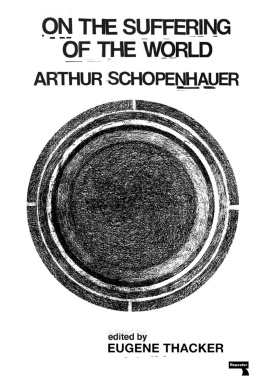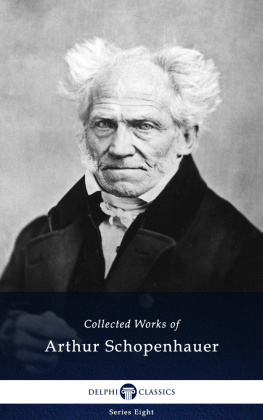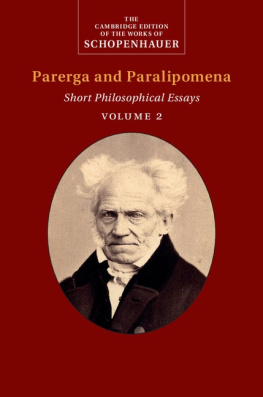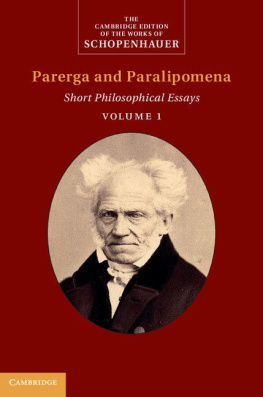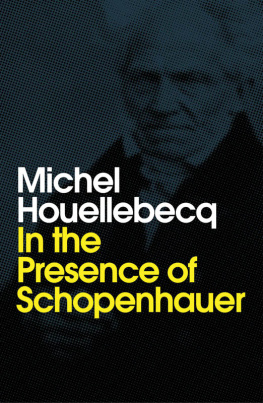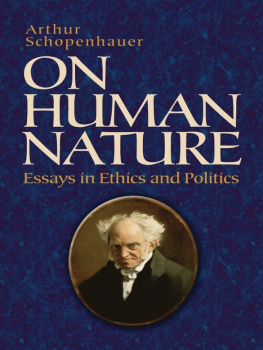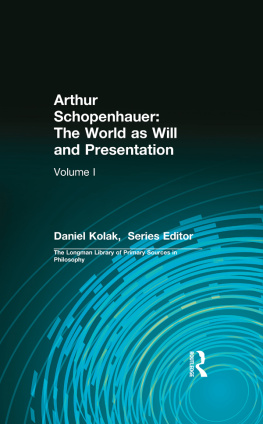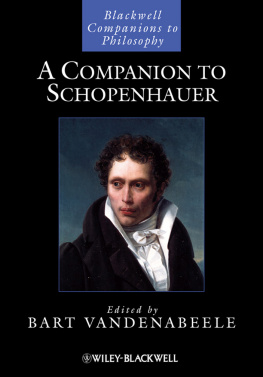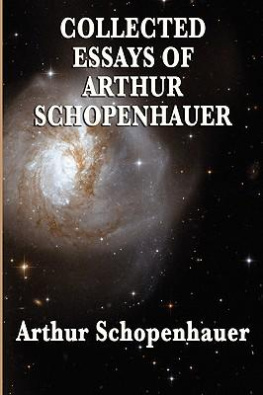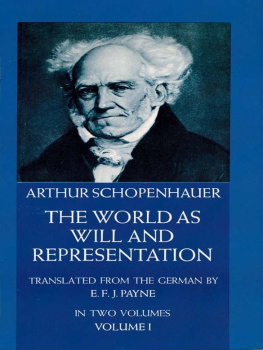Life is not worth living! This is the thought most associated with the German philosopher Arthur Schopenhauer, who was virtually unacknowledged when he died one hundred fifty years ago. Increasingly, however, we understand that behind the mask of a pessimist Schopenhauer was a Zen master and arguably the greatest mystic of the nineteenth century. Schopenhauer roused more than two thousand years of Western philosophy from its delusion about who we really are, by declaring that materialitythe life of the body, rather than the mindwas the driving force of existence.
Schopenhauer has become synonymous with a thoroughly pessimistic worldview. In defiance of tradition, as may be exemplified by Leibniz, he proclaimed we live in the worst of all possible worlds. Wherever a human being dares to admit the truth about our existence, privately or publicly, we find it is Schopenhauers brutal honesty that guides such insights. The German composer Richard Wagner, acquainted with Schopenhauer, famously exclaimed: Finally, I can tell the truth about life! Schopenhauer is not a philosophical writer whose texts are part of any Great Books curriculum, not even at elite universities, since his only interest is in truth itself, no sugarcoating, no political correctness, no respect for precedent. Do not read Schopenhauer! the authorities advise, but the opposite happens. In Germany, Schopenhauer is still the most widely read philosopher, and worldwide it is not only the rebels, nonconformists, contrarians, and outsiders who turn to him but also professionals who have no illusions about the fragility of the human condition and who refuse consolation: physicians, lawyers, writers, artists. Musicians in particular have been drawn to Schopenhauer, who claimed that in music alone are we attuned to the authentic condition of life, without any interference from language.
Very few people are capable of being brutally honest about what it means to be human. Schopenhauers brother-in-spirit, Spinoza, did not play the game of false consolation and phony rationalization, but rather reminded us death is not to be feared; we have only to fear that we have not lived. Among the brave who accept Schopenhauers truth are first and foremost the comedians, the true American philosophers, from The Simpsons to George Carlin and Jon Stewart. Woody Allen held up Schopenhauer as a hero, even mentioning the philosopher in his work; influential writers, Jorge Luis Borges among them, learned German in order to read the philosopher in the original. The French thinker Georges Bataille admired the capacity for laughing in the face of death as a kind of poetry of living.
But Schopenhauers most constant readers are found not only among such eminent personalities. His most intuitive reader emerges in everyone who goes through adolescence, a time when all those who had held our trust and admiration now come under suspicion and we begin questioning. At this stage, we are the most human we can be. Friedrich Nietzsche, educated by Schopenhauer, called humans the non-determined species, and Martin Heidegger pointed to Enowning (Ereignis) as the existential openness that makes us unique. By discovering our authentic self in the turmoil of adolescence, we must leave behind, without regrets, what we are supposed to be. Such an intellectual honesty (Nietzsche) can lead to suicide, an act which demonstrates that I have the ability to take my own life, that I belong to no one, and that I share with others only the condition that we have nothing in common, as Jean-Luc Nancy insists. That teenagers and young adults sometimes take their lives without an apparent good reason is an integral part of true freedomthe freedom to make mistakes, as Americas courageous philosopher Avital Ronell noted. But Schopenhauer also made the most convincing argument against suicide. Taking ones own life merely confirms the unbearable condition of life; through it, we capitulate to what we so despise.
In Schopenhauers ethics, the only worthy task of philosophy is embodied in an incessant struggle until the last breath, with the full knowledge that we can never win the heroic life project. It was Theodor W. Adorno who not only insisted that thinking means thinking against yourself but also stated unrepentantly that a philosopher never escapes puberty. Many Schopenhauer editions picture on their covers the portrait of a miserable old white-haired man, but this is not the person who wrote The World as Will and Representation, his magnum opus. The young man on the back cover of The Essential Schopenhauer is the true author and will always be the philosopher for the young, for creative peopleof any ageand a constant threat to manipulation and socialization. There would be no Sigmund Freud, no Jacques Lacan, without Schopenhauer, who boldly pointed to the sexual organs as the true center of the world. Schopenhauer learned early on that the rationality of Homo sapiens is just a poorly spun veil covering the cruelty of the will-to-live. Schopenhauer spent his entire life, until his death at seventy-two, explaining and augmenting what he understood as a young philosopher.
When he wrote The World as Will and Representation he lived in Dresden, a most remarkable Baroque city before its destruction by Anglo-American bombers in February 1945. In Dresden, Schopenhauer enjoyed a charmed life, not unlike any other young man of means in his late twenties. (It is with good reason that the title of the best book on Schopenhauer, written by Rdiger Safranski, is Schopenhauer and the Wild Years of Philosophy.) After Georg Wilhelm Friedrich Hegel, the leading philosopher of the time, succumbed to a cholera epidemic, Schopenhauer ended his brief period as assistant professor at Berlin University, having insulted the authorities by insisting on teaching only my entire system. A financial crash forced him to live a frugal life using what remained of the inheritance from his father, a wealthy merchant; but at the end of his life Schopenhauer had more money in the bank than at the beginning. A reclusive life of twenty-seven years in the German metropolis Frankfurt am Main allowed him the opportunity to write without being concerned about public reaction. After his death he became known as the Buddha of Frankfurt, a fitting description, as he had discoveredon the basis of not very reliable but still usable ancient Eastern textsthat he had many insights in common with Buddha, and he also introduced Buddhism into the Western philosophical debate. Given that Christianity, the Schopenhauer family faith, also describes earth as a vale of tears and paradise as a mere promise after death, Schopenhauers own thought that life is suffering was not presented as revelation. But as Aristotle observed, a philosophers power lies not in discovering the new, as do scientists, or offering the unexpected, as artists do. Philosophers take the trivial, turn again to supposedly self-evident certainties, thereby revealing their merely dormant validity. The point is that life is suffering, yet we all live as if it were not. The basic truths are always simple and hidden out in the open, unrecognizable as answered questions, shut cases, settled disputes.
The philosopher is the most dangerous member of society, at least according to Nietzsche, because he stirs up what has been put to rest in order to ensure a functioning society. And the philosopher sometimes even recklessly poses questions in a language everyone can understand without the help of self-important experts. Schopenhauer was one of the great German writers, and this comes through even in the English translations. The titles of his books and the excerpts included in this reader are an indication of the hold questions concerning the human condition still have over us: What are the principles of sufficient reason in a world where faulty reason is called smart? What is the basis of morality when ethics become a problem of social engineering or are left to religion? What constitutes the freedom of the will in the age of neurophilosophy? How can the sublime task of the artist and the inner nature of art still be of significance when art has turned into investment? Can we still glean inspiration from unconventional human lifestyles such as those of mystics, saints, and ascetics for the decisive question to come": What does it mean to be a human being? (Immanuel Kant)


